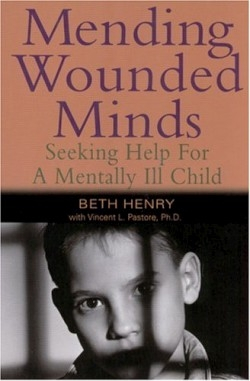
Mending Wounded Minds
Seeking Help for a Mentally Ill Child
“Having a mentally ill family member is like climbing a never-ending spiral staircase,” writes the author. The mother of six children and stepmother of a severely disturbed child and his younger brother, Henry takes the reader up and down and around that staircase. She and her husband fought grim odds to keep a bitterly hostile four-year-old boy at home, despite his tantrums, attacks, and frightening descent into psychosis. The struggle lasted more than five years. She writes with the energy and economy of a beat reporter, mixed with the joy and sorrow of an honest diarist.
Henry and her new husband decided to seek custody of his sons, ages four and two, when it became evident that the boys were malnourished and poorly parented by his ex-wife and her new husband. After gaining custody at considerable cost in time, money, and grief, they found that the boys had been victims of neglect and both physical and sexual abuse. While Bobby was quiet, passive, and malleable, Tommy resisted their love and nonviolent discipline. Henry, a deeply religious, focused, determined person, happy in her marriage and confident that love could heal, learned that the mental health system contains a mixture of elements, some helpful, some neutral, and some bad. The last chapters of the book explain the system, touching on therapy, drugs, the family, lawsuits, and, above all, positive advocacy.
Paradoxically, Henry’s one weakness may be her incredible strength, faith, and persistence. Her children, including three born before she became a stepmother and three after, suffered, along with their parents, from Tommy’s
outrageous behavior. The family ultimately got off the spiral staircase when Tommy was placed in a program for pre-teen offenders; at the end of the story he was living in a supervised group home. Although the other children suffered in this painful process, they also learned about parental devotion and the power of belief in oneself. “Seeing teenagers changing dirty diapers without complaint is an amazing and rare sight,” writes Henry. “They were growing up to be kind, loving, and responsible people.”
The author works training other parents in her methods of advocacy and has published articles in mental health journals. She was assisted on this book by Vincent L. Pastore, a licensed clinical psychologist with a private practice specializing in children and adolescents in North Carolina. Anyone who has responsibility for a mentally ill child, whether parent, mental health professional, lawyer, or legislator, will find this book indispensable. Few will have Henry’s patience or her writing skills, but all will be inspired to do more with what they have.
Disclosure: This article is not an endorsement, but a review. The publisher of this book provided free copies of the book to have their book reviewed by a professional reviewer. No fee was paid by the publisher for this review. Foreword Reviews only recommends books that we love. Foreword Magazine, Inc. is disclosing this in accordance with the Federal Trade Commission’s 16 CFR, Part 255.
